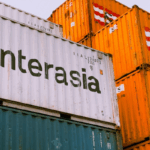Trade is one of those dynamics that not only promotes an enabling environment for economic growth but also improves human conditions by connecting producers with those who need their products. This simple but powerful dynamic is not limited to one locality or region but extends to a global scale, linking geographically distant countries.
International trade, facilitated by the free market, is transforming and adapting to contemporary demands. Elements such as robotics, artificial intelligence, big data analytics, and biometrics are revolutionizing these activities.
A tangible example of this transformation worldwide is the Oxagon project in Saudi Arabia. This project seeks to revolutionize industry, making it advanced and clean and minimizing or even eliminating pollution, thus driving a revolution in commerce and industry.
Within this transformation, Saudi Arabia stands out as a pioneer in developing green hydrogen, an essential energy source for the Oxagon project. This advanced port and industrial city will rely on green hydrogen instead of fossil fuels, which have a more negative environmental impact. This initiative reflects a commitment to environmental well-being, driven by automation, artificial intelligence, and the use of biometrics and digital identity technologies. In addition, the city will incorporate zero-emission heavy machinery, 3D printing, and advanced painting techniques to protect the environment.
Innovation and technological advancement are crucial in this project, which involves seawater desalination, brine management, and advanced smart devices.
Another strength of this project is its strategic location near the Suez Canal, through which approximately 13 percent of the world’s trade transits. This location will enhance the project’s utility and efficiency, and it is expected to be operational within a few years.
Oxagon’s possibilities will grow as free trade expands, serving as an engine for the comprehensive development that Saudi Arabia seeks to achieve with its Saudi Vision 2030 initiative.
This view also resonates with what financial analyst Henkel Garcia, a Metropolitan University graduate, expresses in his book Five Reflections on Free Trade: “Free interaction between different economic actors is a basic ingredient for the generation of welfare.” Technological development in Saudi Arabia suggests that welfare levels in the country could reach outstanding global levels.
* Anderson Noel Riverol is the Co-author of four books, a Researcher in innovation issues, a Graduate of Simón Bolívar University in foreign trade, a Diploma in Petroleum, a Diploma in Public Affairs from IESA, and a Diploma in Governance.
Source: We Are Innovation











